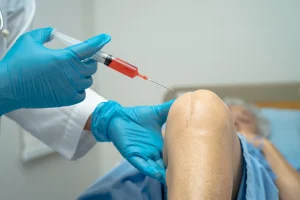Chronic pain can impact nearly every part of your life. Even simple tasks like grocery shopping in Augusta, walking through downtown Aiken, or sitting at work can become overwhelming when pain radiates from your back into your legs. For many patients in the CSRA, the cause is lumbar spinal stenosis, a condition that narrows the spinal canal and places pressure on the nerves.
At Augusta Pain Center, we specialize in advanced, minimally invasive pain management services designed to treat conditions like lumbar spinal stenosis. Our goal is to help patients throughout Augusta, Evans, Martinez, and Aiken reduce their pain and regain independence. One of the most innovative treatments we offer is the Vertiflex Superion implant, which relieves nerve compression without major surgery.
Learn what pain management is, how lumbar spinal stenosis develops, and the treatment options available in Augusta, GA.
What Is Pain Management and Why It Matters
Pain management is not just about prescriptions, it is a medical specialty dedicated to diagnosing the source of pain and creating strategies for long-term relief. For patients in Augusta Aiken, and surrounding areas struggling with chronic back pain, interventional pain management provides hope when conservative treatments no longer work.
At Augusta Pain Center, our approach goes beyond medications. We use targeted injections, minimally invasive procedures, and advanced techniques to treat pain at its root. By addressing conditions like lumbar spinal stenosis directly, patients often avoid major surgery and regain mobility sooner.
Chronic pain also affects mental and emotional health. Left untreated, it can lead to anxiety, depression, and difficulty sleeping. With proper care from our Augusta-based specialists, patients regain not only physical comfort but also the ability to live life with confidence again.
A Patient’s Story: Finding Relief in Augusta
To illustrate how treatment changes lives, consider “James,” a 62-year-old Augusta resident. James had always been active, but over time he developed a burning pain in his lower back that spread down his legs. Walking along the Riverwalk became difficult, and standing at his grandchildren’s soccer games was nearly impossible.
At first, James thought it was just normal aging. He tried over-the-counter medications and rest, but nothing seemed to help. Eventually, his primary care provider referred him to Augusta Pain Center. After a comprehensive evaluation, he was diagnosed with lumbar spinal stenosis and began a plan that included injections and physical therapy.
When those measures didn’t provide enough relief, James underwent the Vertiflex procedure. Within weeks, he was walking longer distances, standing comfortably, and spending more time with his family. For James, treatment in Augusta was not just about reducing pain, it was about regaining his life.
Understanding Lumbar Spinal Stenosis
Lumbar spinal stenosis is one of the most common conditions we treat at Augusta Pain Center. It occurs when the spinal canal narrows in the lower back and compresses the nerves that run into the legs. This compression leads to pain, tingling, weakness, and numbness, making daily activities more difficult.
Because the lumbar spine carries much of the body’s weight, it is particularly vulnerable to wear and tear. Over time, degeneration reduces the space available for nerves, which is why so many patients begin noticing symptoms in midlife or later.
The effects extend beyond the back. Patients often describe radiating pain into the buttocks, thighs, and calves. This discomfort limits walking, standing, and even resting comfortably, turning once-simple tasks into daily struggles.
Causes of Lumbar Spinal Stenosis
For many residents of Augusta, lumbar spinal stenosis develops gradually due to aging. Over time, joints, discs, and ligaments change, narrowing the canal and squeezing nerves. This explains why spinal stenosis is most often diagnosed in adults over 50.
Arthritis is another frequent contributor. As arthritis progresses in the spine, it often produces bone spurs that crowd the spinal canal. Degenerative disc disease can have a similar effect. Thinning discs reduce cushioning between vertebrae, creating more pressure on nerves. Spondylosis, a degenerative condition of the spine, can also make narrowing worse.
Although less common, tumors, infections, or bone disorders such as osteoporosis sometimes cause stenosis. Regardless of the cause, chronic pain services at Augusta Pain Center help patients find answers and relief.
Symptoms of Lumbar Spinal Stenosis
Symptoms usually appear gradually but worsen over time. Patients in Augusta often report persistent lower back pain that grows worse with activity. Some describe sharp or burning pain that radiates through the buttocks and legs.
Nerve compression can also create tingling, numbness, or weakness. In some cases, patients develop “foot drop,” where the foot drags slightly while walking. These neurological issues make it hard to stay active and can diminish confidence.
Interestingly, many people find temporary relief when sitting or leaning forward. This posture briefly creates more space in the spinal canal. But the relief is short-lived, and without treatment, symptoms typically progress. If you notice these warning signs, it’s important to request an appointment for an evaluation.
Treatment Options for Lumbar Spinal Stenosis
At Augusta Pain Center, every patient receives an individualized treatment plan. For some, conservative care is effective. Physical therapy helps strengthen the muscles that support the spine, while medications reduce inflammation and discomfort. Lifestyle changes such as weight management and posture improvement also provide support.
Epidural steroid injections, another common option, deliver medication directly around inflamed nerves. This treatment can provide relief for weeks or months, helping patients in Augusta maintain their daily routines.
When conservative approaches don’t provide enough improvement, advanced options become the next step. Our team offers a full range of minimally invasive procedures designed to relieve pain and restore mobility with minimal downtime.
The Vertiflex Superion Implant
For patients in Augusta, GA, who have tried conservative care without success, the Vertiflex Superion implant is one of the most effective solutions available. This FDA-approved minimally invasive treatment was designed specifically for lumbar spinal stenosis and is less invasive than traditional surgery.
The implant restores space between vertebrae, easing the pressure on spinal nerves. Unlike spinal fusion, Vertiflex preserves natural movement, so patients continue to bend and move comfortably.
Because it is minimally invasive, recovery is much smoother. Most patients go home the same day, and many notice relief soon after the procedure. For people across Augusta and Aiken, Vertiflex has provided the breakthrough they needed to move freely again.
How the Vertiflex Procedure Works
The procedure is performed through a small incision in the lower back. Our spine specialists insert the device between two vertebrae, where it expands slightly to create more space for nerves.
The difference is often noticeable immediately. Patients report less pain when standing or walking, and the symptoms of burning or tingling down the legs begin to fade.
Another advantage of the Vertiflex procedure is its flexibility. If patients require additional treatment later, the implant does not interfere with future care. This makes it a safe, long-term solution for Augusta residents with spinal stenosis.
Is the Vertiflex Implant Right for You?
Not every patient with lumbar spinal stenosis requires an implant, but for those who haven’t found relief through therapy, medications, or injections, Vertiflex can be life-changing. At Augusta Pain Center, Dr. Richard Epter and our team carefully evaluate each patient’s condition to determine the best course of action.
If you live in Augusta, Evans, Aiken, or surrounding areas and have persistent pain, numbness, or weakness despite conservative treatment, Vertiflex may be the next step in treatment and relief. Our spine specialists will explain the procedure, answer questions, and guide you through your options.
Our goal is always the same: to reduce pain, maintain mobility, and restore independence for patients across the CSRA.
Who Is Most at Risk for Lumbar Spinal Stenosis
Lumbar spinal stenosis is most often diagnosed in adults over 50. As the spine naturally changes with age, discs thin and joints stiffen, leading to nerve compression.
That said, younger patients are not immune. People with arthritis, prior spinal injuries, or congenital spine conditions may develop stenosis earlier. Some individuals are even born with narrow spinal canals, which increases their risk.
The most important step is seeking care early. With guidance from Augusta Pain Center, patients can find answers and avoid progression.
FAQs: Lumbar Spinal Stenosis in Augusta, GA
Can lumbar spinal stenosis go away on its own?
Unfortunately, no, lumbar spinal stenosis usually does not go away on its own. Early diagnosis helps prevent progression.
Is the Vertiflex implant covered by insurance?
While the Vertiflex Superion implant is FDA-approved, be sure to ask your insurance provider to learn about your specific plan coverage.
How long does recovery take?
Most patients go home the same day and recover far faster from this minimally invasive procedure than with traditional spine surgery.
When should I see a doctor?
If you notice persistent back or leg pain, tingling, or weakness, it’s time to schedule an appointment.
Take the Next Step Toward Lower Back Pain Relief
Living with lumbar spinal stenosis in Augusta, GA, can be overwhelming, but you don’t have to face it alone. Augusta Pain Center combines compassionate care with advanced treatments like the Vertiflex Superion implant to provide meaningful relief.
If you’ve tried conservative care without success, or if your symptoms are worsening, now is the time to act. Whether you live in Augusta, Evans, Martinez, or Aiken, our team is ready to help.
Take the first step by visiting Augusta Pain Center and scheduling your consultation today. With the right plan, you can reduce your pain, restore mobility, and get back to the activities you love.





